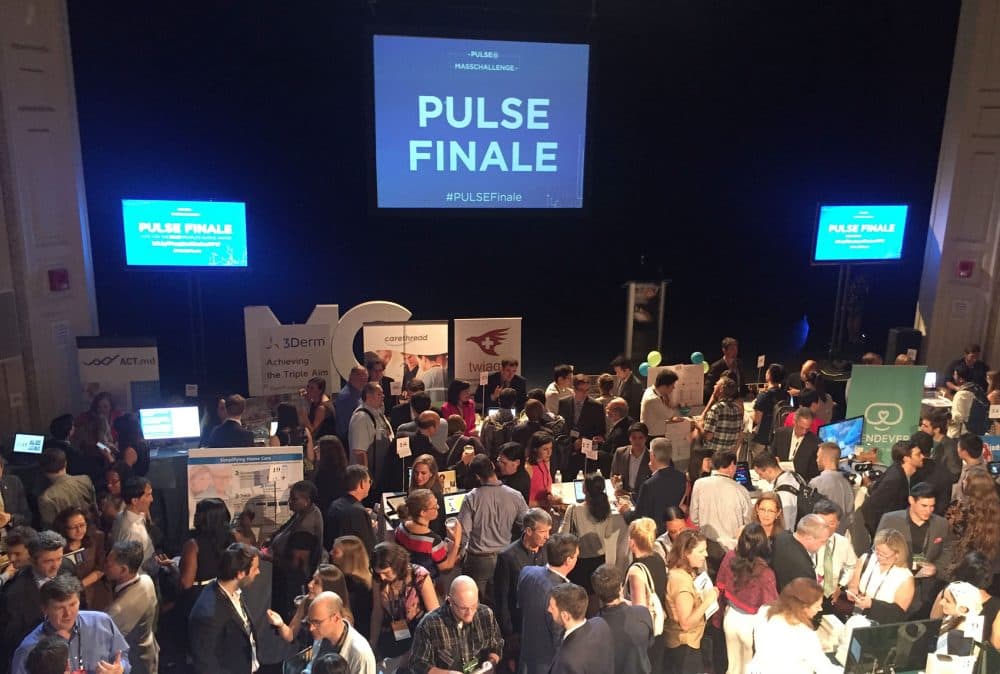Advertisement
Innovation Boost: 3 Digital Health Startups Win Cash To Accelerate Business

Three digital health startups — one to help detect concussions, another to streamline emergency medicine, and a third to improve the mental health of seniors — were awarded a total of $200,000 Tuesday as part of an innovative accelerator program aimed at boosting such ventures across the state.
Speaking to a crowd of about 600 at the PULSE@MassChallenge awards ceremony Tuesday night, Gov. Charlie Baker described the competition as "'American Idol' for really smart tech people."
Health care, he said, is "an enormous part of our economy, but it has trouble sometimes seeing the next interesting idea. This gives us the ability to run with some interesting ideas."
He applauded the PULSE participants for their ability to "think differently about disease, to think differently about health...about aging... nutrition; to think differently about so many things and to leverage this constantly developing space."
In addition, Baker announced that the state plans to grant another $250,000 to further support digital health innovation -- $170,000 to PULSE@MassChallenge, and $80,000 to TechSpring, Baystate Health's technology innovation center in Springfield.
The top winners of PULSE's cash prizes were selected based on their ability to demonstrate impact and meet milestones while working over the past six months with established corporate partners, including leading health care companies and big-name medical institutions.
Here are the three winning startups, and how much they were awarded:
-- $100,000 – SyncThink
SyncThink, of Boston, says it has developed the first tool to objectively screen for "ocular-motor synchronization," a key impairment in concussion. Through eye-tracking, the tool "overcomes the limitations of traditional cognitive testing to provide a [sports] sidelines-deployable, 60-second tool for remove-from-play screening and return-to play brain performance monitoring," the company says.
-- $60,000 – Twiage
The New York City startup describes its cloud-based platform as using security technology to put "telemedicine at the fingertips of emergency first responders and physicians to accelerate live-saving patient care." Twiage says its platform helps hospitals prepare for patients before they arrive by providing vital medical information.
-- $40,000 – Rendever
This Cambridge startup, launched by MIT MBA students, developed a virtual reality platform to improve the quality of life of older adults. In particular, the company says, it helps patients feel less socially isolated, and improves mental health through technology that allows seniors to relive and remember personal and family experiences and explore new environments.
The winners were chosen by a panel of judges from among 31 startups that range from a platform to help people organize and think through their end-of-life wishes, to an app that nudges substance users away from risky social contacts.
Nick Dougherty, PULSE@MassChallenge's program director, said the competition among finalists was stiff, and that all of the startups have the potential to transform lives.
"For patients, these companies aren't just companies, they're solutions to real problems that are facing them," he said before the event. "Being a patient is not fun, and these technologies have a way to improve the lives of those people that need care and improve the lives of people that want to avoid the health care system."
This was the first-ever health-care-only competition led by PULSE@MassChallenge, the nonprofit accelerator. Earlier this year, PULSE awarded $50,000 in scholarships to 10 digital health startups.
The program is part of the governor's digital health initiative to broaden the sector within Massachusetts and make the state a digital hub.
In awarding the top prize at the PULSE ceremony, Dr. Jeffrey Leiden, CEO of Vertex, spoke of the sweep and potential power of digital health care:
From apps that help kids with their chronic conditions remember to take their medicines, to devices that can help detect a major medical event before it happens, to virtual reality for physical therapy, digital health care is a reality and will continue to revolutionize the way we take care of patients and transform the health and well-being of everyone.
We in Massachusetts are uniquely and perfectly positioned to capture this next wave of technology because it plays to all of our strengths: world-class academic institutions and research labs, the best teaching hospitals in the country, a deep talent pool of enthusiastic entrepreneurs — you — and engaged leaders in government and industry.
The 31 competing startups in PULSE were selected from among more than 430 applicants from 30 states and 20 countries, Dougherty said.
At Tuesday night's event, an additional $20,000 was awarded to two startups, 3Derm and ACT.md, through funds raised by PULSE partners.
